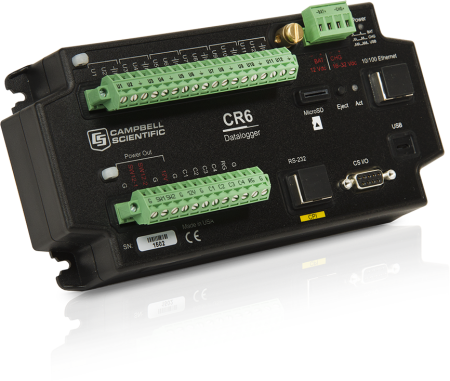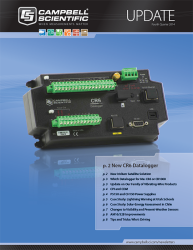
We are excited to announce our newest datalogger, the CR6 Measurement and Control Datalogger. The CR6 is a major step forward in terms of flexibility, measurement quality, performance, and integration. While we've packed it with new capabilities, we've retained the rugged design and reliability that you've come to expect from Campbell Scientific loggers. We expect the CR6 to become a popular datalogger for a wide variety of applications. We have added new features that add to the capabilities you're accustomed to. If you rely on dataloggers to do your job, odds are there are some new features that you'll be excited about. Read on to find out what they are.
Flexibility
We can say with confidence that the CR6 is our most flexible datalogger ever. It all starts with the 12 universal channels that allow connection to nearly any sensor type (e.g., single or differential voltage input, SDI-12, pulse). This flexibility removes many constraints involved with matching sensors to terminals or not having enough of a specific type of terminal. It gives the CR6 the ability to match more applications, eliminates the use of many external peripherals, allows project needs to evolve without having to swap out the datalogger or add peripherals, and ultimately leads to long-term datalogger reuse and maximization of your datalogging investment.
We've also made the terminals field-friendly. You can easily remove them when wiring sensors or swapping out the datalogger or sensors. Terminals are lockable, angled, and fit larger-gage wires or even multiple wires.
With onboard power conditioning and expanded charging options, you have a lot more flexibility in the way you power the CR6: 12 V battery, 10 to 32 Vdc power supply, UPS with solar panel, UPS with ac-to-dc converter, and even some functionality with power over USB. Batteries and solar panels can be connected directly to the CR6 without having to go through a power-conditioning peripheral.
The CR6 uses the same powerful CRBasic programming language used by our other current dataloggers. This gives you all the power of a full programming language to make and store measurements exactly the way you want to. Programs or code snippets that you've used with our other loggers will carry over to the CR6.
If all of the flexibility mentioned above isn't enough, we've also added a CPI port that will allow the CR6 to tap into a whole new line of measurement peripherals through our new CPI bus (see article on page 5). This line of peripherals, called Campbell distributed modules (CDMs), will offer distributed measurements, higher speed, dynamic vibrating-wire measurements, distributed datalogging, specialized sensors, measurement synchronization, and other capabilities. It adds extensibility to an already very flexible datalogger.
Measurement Quality
Measurement quality has always been important to Campbell Scientific, and the CR6 takes a step forward in this area. A 24-bit A/D sigma-delta converter gives you analog resolution as small as 80 nV. The CR6 has three analog ranges with multiple filtering options and digital signal processing (DSP) oversampling technique for low-noise measurements. We also guarantee performance over the full temperature range (-55° to +85°C)—ensuring measurement quality in all types of environments.
Integration
The CR6 takes the capabilities previously offered through several different external peripherals and provides them all natively—and in a more compact footprint: 20.3 by 10.2 by 6.1 cm (8.0 by 4.0 by 2.4 in.). The following functionality is native on the CR6:
- Ethernet 10/100
- Memory card data storage (microSD)
- USB
- Power conditioning
- Serial sensor measurements (RS-232 and RS-485)
- Vibrating-wire measurements using our patented noise-reduction process, VSPECT (see vibrating-wire article)
- Wi-Fi (option coming soon)
Eliminating the need for added peripherals to get the functionality listed above not only reduces overall system cost, but it eliminates the hassle of integrating and installing multiple peripherals. All of this capability comes in a package that is two-thirds the size of the CR1000. In short, you get a simpler, leaner, less-expensive system, but with all the same functionality—and likely much more.
Performance
A 32-bit processor running at 100 MHz with minion architecture gives the CR6 plenty of power to speed up every area of the datalogger. But this additional capability doesn't result in a power hungry datalogger. The CR6 features smart power management that provides access to this speed only when needed, allowing the logger to conserve power. Add to this a quiescent current drain of less than 1 mA and the CR6 easily fits remote applications with no access to ac power. Future CDM modules will provide faster scan rates for those applications that need faster measurements.
This performance boost affects everything, including an internal web server that provides an instant, responsive website for IP-enabled installations. The default web page can be customized and branded however you want, allowing access to data display, configuration options, diagnostics, and security.
Rugged Reliability
This year we're celebrating our 40th year as a company, and throughout our history our dataloggers have proven that they can be counted on in harsh environments of all types and in remote locations. Our loggers have shown reliability year after year, demonstrating great product longevity. We have the same high expectations for the CR6. It has been vibration and shock tested, and it features: a wide operating-temperature range; surge, ESD, and overvoltage protection (giving it a CE industrial outdoor rating); dust protection; nonvolatile memory; and battery-backed clock and memory. All that great flexibility, performance, and integrated functionality is for naught if your datalogger can't stand up to the elements and the years. You can count on the CR6 to do that.
We are excited about the CR6. Its flexibility and performance make it an investment that will pay off for years to come. Take a close look at it and see what it will do to help your datalogging applications.

